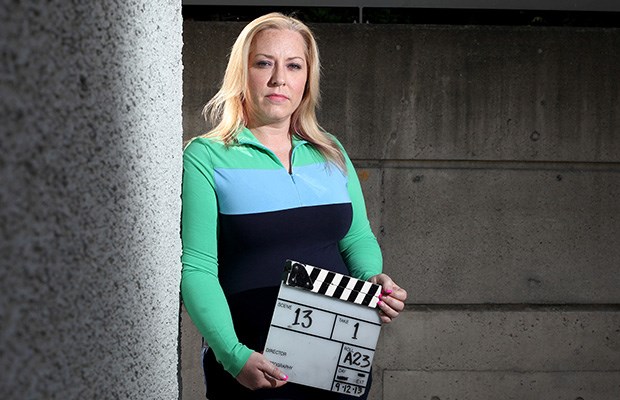According to Vancouver's Lecily Corbett, she's hit her head on the proverbial glass ceiling so many times she should have shards of glass in her hair. With the downturn in the B.C. film industry, the glass ceiling has added a wall.
Corbett, a TV and film camera assistant with over 20 years experience, said back when Vancouver flourished as Hollywood North there was enough work to go around and she made a good living. Not because there wasn't gender discrimination, but because she is great at her job and there was enough work for everyone. When local work started drying up, she said female camera assistants and operators were out of work to a greater degree than their male counterparts.
"[Most] boys stick together when times get tough," said Corbett.
Marcus Handman, business agent for the union that represents camera crews, International Alliance of Theatrical Stage Employees (IATSE) local 669, agrees women are under represented in the camera department, but said via email that, "the problem is more systemic and not driven by the economy." Corbett said she didn't expect sexism to be a barrier this late in her career. When she started in the early 1990s - and would often walk into camera trucks wallpapered with Playboy centrefolds - Corbett said she decided not to get married or have children.
"I thought the perception was women would take off and have kids, I didn't do that and thought I would be respected. How naïve I was," said Corbett.
Today, while the centrefold pictures are gone, she claims the sexism has just "gotten quieter." There are certain crews, Corbett said, that never hire women. It's also still common to hear sexual innuendo on set.
"It's sad to say, you grow accustomed to it," said Corbett who compares film and TV sets to junior high schools filled with the humour of 14-year-old boys. If you want to be hired it helps to be young and attractive, she said, and to have a thick skin.
A 2010 study prepared for the Department of Canadian Heritage and Telefilm Canada found two-thirds of women working in B.C. in the film industry said they faced gender-based discrimination. Students training for the industry didn't fare much better with one-third of the women reporting they experienced sexism. Female students said it was especially challenging competing for camera jobs where they felt they were judged as less competent.
Corbett also teaches camera trainees and "actively discourages young women from going the camera route." For those who are really passionate about camera work she encourages "ruthless aggression" to help them survive their careers.
Camera operator Jill MacLauchlan, who has been in the film industry over 30 years, agrees it is tough for women in her industry. She said she feels she has to be "almost as good or better than the best guy "in order to get a job. She has found it doesn't necessarily help to have woman running the set.
"Women in director roles are generally not supportive of other women in non-traditional roles," said MacLauchlan. "Perhaps they don't want to share the limelight."
Both Corbett and MacLauchlan said in spite of the challenges they will continue in their craft. "I love it," said Corbett, "I wish I hated it, but I love it."



